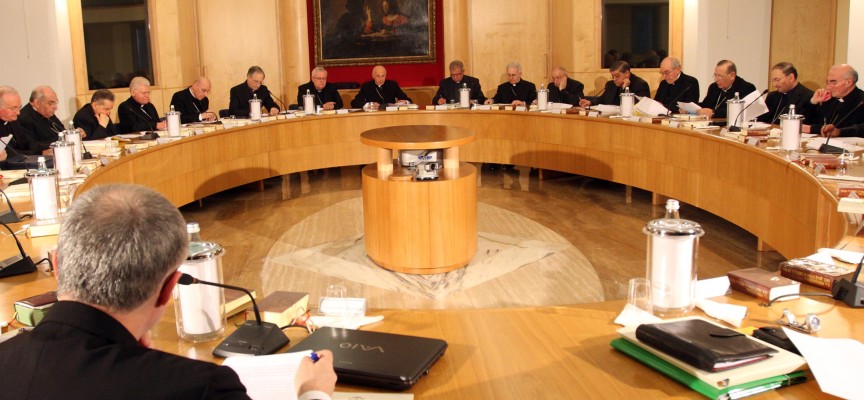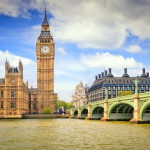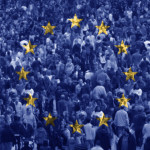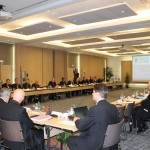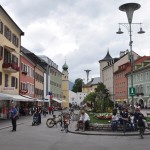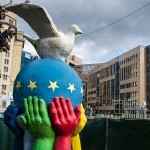In the light of recent events, we must reaffirm that today we need more from Europe. Is it possible to think that in the vortex of the globalized world, where many schemes and parameters have fallen through, it is possible to live distancing the one from the other? This has nothing to do with some form of internationalism that creates a confusion of peoples: being a people, in fact, means having a mission at a highest community, as each people has a wealth of history and culture to offer. Only in this way Europe will be the place of the overcoming of every form of chauvinism, which aims at excelling and imposing on the individual members: every reality, in fact, becomes what it should be only within a greater harmony, of the European spiritual community. The nationalisms are not won either with forced homogenisation, which is a subtle expression of violence, or with the myopic irenicism which is a sophisticated form of ethical deviation and cancellation of identity. Let no one think that a repetition of a Eurocentric view of the world is required; if we look at the geography of the planet, each continent has something to bring to everyone, something peculiar, which today is emerging in a clearer and progressive manner.
The exodus of so many desperate people who knock at the doors of the continent is going on. The Holy Father never tires of recalling the style of reception and integration that requires generosity and political and social intelligence; it is a style that involves everyone, the ones who receive and the ones who are accepted. Italy is at the forefront and, despite objective difficulties, continues to do everything possible on this front that however still leaves it too alone. The Christian communities are trying to broaden the acceptance, especially the heart one, so that we can go beyond the emergency towards programs of integration for the many who – showing awareness and commitment – wish to stay.
Rather than many poor desperate people wishing to enter the continent, Europe should fear the change of the way of thinking that is being imposed from the outside. The Pope has many times warned against “colonizations” which are happening, which he calls “single thought”: it wants to force to think the same way, with the same judging criteria above good and evil. Propagandizing obsessively certain lifestyles, inculcating the principle of pleasure at any cost, enhancing the “goddess of fortune” and play instead of the taste of duty, of work, of honesty; insinuating the hassle of ties, if these do not satisfy always and anyway, making people dream a perennial youth, pushing in search of continuous evasion from real life, not sustaining loyalty to the commitments of the couple, the family and work … all this connotes a cultural mutation that alienates the person from himself and from reality, flattens on everything and immediately, imprisons in an exaggerated individualism, shown as if it were freedom. In this climate the ego stands separate, free from contacts, alone with itself. In interpersonal relationships the “neighbour” disappears, remains “the other”, “the stranger”, even the “enemy.” Who benefits from such a cultural change, which changes the lifestyles? It is evident that the isolation of the people, the fear of the others, the conflict between states, the destabilization of the family, of groups and nations, favour cynical and often obscure profiteers, dedicated to make money and gain power. It is this way of thinking that the old world should fear, rather than wooing it and chasing it complacently.
But it seems that, after the result of the English “brexit”, a few timid glimmer of conscience on what should be the foundation of European home begins to be seen: culture, that has shaped Europe in its variety. Over the centuries, in spite of wars and conflicts, a common understanding has emerged, has inspired history and civilization. Mentioning generically “our values” is useless: it can mislead the listener if it not explicited what they are, on what they are founded, what civilization they have inspired, what kind of man they have built. We believe that no man is an island, because each person is called to be realized together with the others, radically religious, because he is open to the Absolute, to God who revealed himself in Jesus Christ and whose word was the bedrock of the continent. This means recognizing in the person a world not only physical, but also spiritual and ethical, a self that, without getting lost, is fulfilled only in us together. This is the true heritage on which the Union must re-establish itself.
(Card. Angelo Bagnasco – From the opening address Cep / CEI September 26th, 2016)
The exodus of so many desperate people who knock at the doors of the continent is going on. The Holy Father never tires of recalling the style of reception and integration that requires generosity and political and social intelligence; it is a style that involves everyone, the ones who receive and the ones who are accepted. Italy is at the forefront and, despite objective difficulties, continues to do everything possible on this front that however still leaves it too alone. The Christian communities are trying to broaden the acceptance, especially the heart one, so that we can go beyond the emergency towards programs of integration for the many who – showing awareness and commitment – wish to stay.
Rather than many poor desperate people wishing to enter the continent, Europe should fear the change of the way of thinking that is being imposed from the outside. The Pope has many times warned against “colonizations” which are happening, which he calls “single thought”: it wants to force to think the same way, with the same judging criteria above good and evil. Propagandizing obsessively certain lifestyles, inculcating the principle of pleasure at any cost, enhancing the “goddess of fortune” and play instead of the taste of duty, of work, of honesty; insinuating the hassle of ties, if these do not satisfy always and anyway, making people dream a perennial youth, pushing in search of continuous evasion from real life, not sustaining loyalty to the commitments of the couple, the family and work … all this connotes a cultural mutation that alienates the person from himself and from reality, flattens on everything and immediately, imprisons in an exaggerated individualism, shown as if it were freedom. In this climate the ego stands separate, free from contacts, alone with itself. In interpersonal relationships the “neighbour” disappears, remains “the other”, “the stranger”, even the “enemy.” Who benefits from such a cultural change, which changes the lifestyles? It is evident that the isolation of the people, the fear of the others, the conflict between states, the destabilization of the family, of groups and nations, favour cynical and often obscure profiteers, dedicated to make money and gain power. It is this way of thinking that the old world should fear, rather than wooing it and chasing it complacently.
But it seems that, after the result of the English “brexit”, a few timid glimmer of conscience on what should be the foundation of European home begins to be seen: culture, that has shaped Europe in its variety. Over the centuries, in spite of wars and conflicts, a common understanding has emerged, has inspired history and civilization. Mentioning generically “our values” is useless: it can mislead the listener if it not explicited what they are, on what they are founded, what civilization they have inspired, what kind of man they have built. We believe that no man is an island, because each person is called to be realized together with the others, radically religious, because he is open to the Absolute, to God who revealed himself in Jesus Christ and whose word was the bedrock of the continent. This means recognizing in the person a world not only physical, but also spiritual and ethical, a self that, without getting lost, is fulfilled only in us together. This is the true heritage on which the Union must re-establish itself.
(Card. Angelo Bagnasco – From the opening address Cep / CEI September 26th, 2016)
Alla luce degli ultimi avvenimenti, dobbiamo riaffermare che oggi c’è bisogno di un di più di Europa. È possibile pensare che nel vortice del mondo globalizzato, dove sono saltati molti schemi e parametri, sia possibile vivere allontanandosi gli uni dagli altri? Ciò non ha nulla da vedere con qualche forma di internazionalismo che crea confusione di popoli: essere popolo, infatti, significa avere una propria missione presso la comunità più alta, in quanto si ha un patrimonio di storia e di cultura da offrire. Solo così l’Europa sarà il luogo del superamento di ogni forma di sciovinismo, che mira a primeggiare e a imporsi ai singoli membri: ogni realtà, infatti, diviene ciò che deve essere solo all’interno di una armonia superiore, della comunità spirituale europea. I nazionalismi non si vincono né con l’omologazione forzosa, che è una sottile espressione di violenza, né con l’irenismo miope che è una forma sofisticata di deriva etica e di annullamento identitario. Nessuno pensi che si voglia riproporre una visione eurocentrica del mondo; se guardiamo la geografia del pianeta, ogni continente ha qualcosa da portare a tutti, qualcosa di peculiare, che oggi sta emergendo in modo più chiaro e progressivo.
Continua l’esodo di tanti disperati che bussano alle porte del continente. Il Santo Padre non si stanca di richiamare lo stile dell’accoglienza e dell’integrazione, che richiede generosità e intelligenza politica e sociale; è uno stile che coinvolge tutti, chi accoglie e chi è accolto. L’Italia è in prima linea e, nonostante difficoltà oggettive, continua a fare tutto il possibile su questo fronte che la vede ancora troppo sola. Le comunità cristiane cercano di allargare gli spazi dell’accoglienza e soprattutto del cuore, affinché si vada oltre l’emergenza verso percorsi di integrazione per quanti –
mostrando consapevolezza e impegno – desiderano rimanere.
Più che di tanta povera gente disperata che bussa alle porte del continente, l’Europa dovrebbe temere il cambiamento del modo di pensare che si vuole imporre dall’esterno. Il Papa molte volte ha messo in guardia dalle “colonizzazioni” in atto, che chiama “pensiero unico”: esso vuole costringere a pensare nello stesso modo, con gli stessi criteri di giudizio al di sopra del bene e del male. Propagandare in modo ossessivo certi stili di vita, inculcare il principio del piacere a qualunque costo, esaltare la “dea fortuna” e il gioco anziché il gusto del dovere, del lavoro, della onestà; insinuare il fastidio dei legami, se questi non appagano sempre e comunque, far sognare una perenne giovinezza, spingere alla ricerca di evasioni continue dalla vita reale, non sostenere la fedeltà agli impegni di coppia, di famiglia, di lavoro… tutto questo connota una mutazione culturale che aliena la persona da se stessa e dalla realtà, la appiattisce sul tutto e subito, la imprigiona in un individualismo esasperato, propagato come libertà. In questo clima l’io resta separato, privo di contatti, solo con se stesso. Nelle relazioni interpersonali scompare il “prossimo”, resta “l’altro”, “l’estraneo”, addirittura il “nemico”. A chi giova un tale cambiamento culturale, che muta gli stili di vita? È evidente che l’isolamento delle persone, la paura degli altri, il conflitto tra Stati, la destabilizzazione della famiglia, di gruppi e Nazioni, favoriscono approfittatori cinici, e spesso oscuri, attenti a lucrare denaro e potere. È questo modo di pensare che il vecchio mondo dovrebbe temere, anziché corteggiarlo e inseguirlo compiaciuto.
Sembra però che, dopo il risultato della “brexit” inglese, cominci a vedersi qualche timido barlume di coscienza su ciò che dovrebbe essere il fondamento della casa europea: la cultura, che ha costruito l’Europa nella sua varietà. Nei secoli, nonostante conflitti e guerre, un comune sentire si è affermato, ha ispirato storia e civiltà. Accennare genericamente ai “nostri valori” non serve a nulla: può ingannare chi ascolta se non si esplicita quali sono, su che cosa sono fondati, quale civiltà hanno ispirato, quale figura di uomo hanno costruito. Crediamo che nessun uomo è un’isola, ognuno è persona perché chiamato a realizzarsi insieme agli altri, radicalmente religioso perché aperto all’Assoluto, a Dio che si è rivelato in Gesù Cristo e la cui parola è stata l’humus del continente. Ciò significa riconoscere nella persona un mondo non solamente fisico, ma anche spirituale ed etico, un io che, senza perdersi, si compie solamente nel noi. È questo il vero patrimonio su cui l’Unione deve rifondare se stessa.
(Card. Angelo Bagnasco – Dalla prolusione Cep/Cei 26 settembre 2016)
Continua l’esodo di tanti disperati che bussano alle porte del continente. Il Santo Padre non si stanca di richiamare lo stile dell’accoglienza e dell’integrazione, che richiede generosità e intelligenza politica e sociale; è uno stile che coinvolge tutti, chi accoglie e chi è accolto. L’Italia è in prima linea e, nonostante difficoltà oggettive, continua a fare tutto il possibile su questo fronte che la vede ancora troppo sola. Le comunità cristiane cercano di allargare gli spazi dell’accoglienza e soprattutto del cuore, affinché si vada oltre l’emergenza verso percorsi di integrazione per quanti –
mostrando consapevolezza e impegno – desiderano rimanere.
Più che di tanta povera gente disperata che bussa alle porte del continente, l’Europa dovrebbe temere il cambiamento del modo di pensare che si vuole imporre dall’esterno. Il Papa molte volte ha messo in guardia dalle “colonizzazioni” in atto, che chiama “pensiero unico”: esso vuole costringere a pensare nello stesso modo, con gli stessi criteri di giudizio al di sopra del bene e del male. Propagandare in modo ossessivo certi stili di vita, inculcare il principio del piacere a qualunque costo, esaltare la “dea fortuna” e il gioco anziché il gusto del dovere, del lavoro, della onestà; insinuare il fastidio dei legami, se questi non appagano sempre e comunque, far sognare una perenne giovinezza, spingere alla ricerca di evasioni continue dalla vita reale, non sostenere la fedeltà agli impegni di coppia, di famiglia, di lavoro… tutto questo connota una mutazione culturale che aliena la persona da se stessa e dalla realtà, la appiattisce sul tutto e subito, la imprigiona in un individualismo esasperato, propagato come libertà. In questo clima l’io resta separato, privo di contatti, solo con se stesso. Nelle relazioni interpersonali scompare il “prossimo”, resta “l’altro”, “l’estraneo”, addirittura il “nemico”. A chi giova un tale cambiamento culturale, che muta gli stili di vita? È evidente che l’isolamento delle persone, la paura degli altri, il conflitto tra Stati, la destabilizzazione della famiglia, di gruppi e Nazioni, favoriscono approfittatori cinici, e spesso oscuri, attenti a lucrare denaro e potere. È questo modo di pensare che il vecchio mondo dovrebbe temere, anziché corteggiarlo e inseguirlo compiaciuto.
Sembra però che, dopo il risultato della “brexit” inglese, cominci a vedersi qualche timido barlume di coscienza su ciò che dovrebbe essere il fondamento della casa europea: la cultura, che ha costruito l’Europa nella sua varietà. Nei secoli, nonostante conflitti e guerre, un comune sentire si è affermato, ha ispirato storia e civiltà. Accennare genericamente ai “nostri valori” non serve a nulla: può ingannare chi ascolta se non si esplicita quali sono, su che cosa sono fondati, quale civiltà hanno ispirato, quale figura di uomo hanno costruito. Crediamo che nessun uomo è un’isola, ognuno è persona perché chiamato a realizzarsi insieme agli altri, radicalmente religioso perché aperto all’Assoluto, a Dio che si è rivelato in Gesù Cristo e la cui parola è stata l’humus del continente. Ciò significa riconoscere nella persona un mondo non solamente fisico, ma anche spirituale ed etico, un io che, senza perdersi, si compie solamente nel noi. È questo il vero patrimonio su cui l’Unione deve rifondare se stessa.
(Card. Angelo Bagnasco – Dalla prolusione Cep/Cei 26 settembre 2016)
Latest posts by EURCOM (see all)
- What are the aims of the European security and defence policy? - 12 aprile 2017
- The Church is for the European project - 28 marzo 2017
- A message for Europe - 28 marzo 2017

